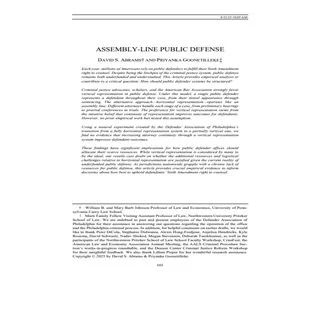By David Abrams and Priyanka Goonetilleke
Each year, millions of Americans rely on public defenders to fulfill their Sixth Amendment right to counsel. Despite being the linchpin of the criminal justice system, public defense remains both underfunded and understudied. This article provides empirical analysis to contribute to a critical question: How should public defender systems be structured? Criminal justice advocates, scholars, and the American Bar Association strongly favor vertical representation in public defense. Under this model, a single public defender represents a defendant throughout their case, from initial appearance through sentencing. The alternative approach—horizontal representation—operates like an assembly line: Different attorneys handle each stage of a case, from preliminary hearings to pretrial conferences to trials. The preference for vertical representation stems from the intuitive belief that continuity of representation improves outcomes for defendants. However, no prior empirical work has tested this assumption. Using a natural experiment created by the Defender Association of Philadelphia’s transition from a fully horizontal representation system to a partially vertical one, we find no evidence that increasing attorney continuity improves defendant outcomes. These findings have significant implications for how public defender offices should allocate their scarce resources. While vertical representation is considered by many as the ideal, our results cast doubt on whether the additional resources and logistical challenges relative to horizontal representation are justified, given the current reality of underfunded public defense. As jurisdictions nationwide grapple with a chronic lack of resources for public defense, this article provides crucial empirical evidence to inform decisions about how best to uphold defendants’ Sixth Amendment right to counsel.
New York University Law Review No. 5 (forthcoming), Northwestern Law & Econ Research Paper No. 25-05, Northwestern Public Law Research Paper No. 25-22, U of Penn, Inst for Law & Econ Research Paper No. 25-10,





